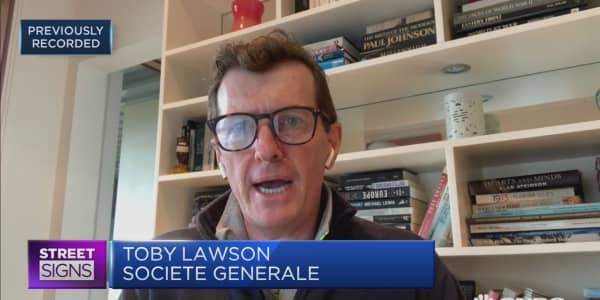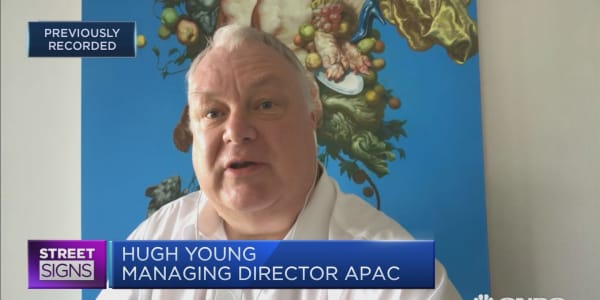America's opioid addiction is headed for a court date, and the case could set a legal precedent as American businesses and families attempt to slow the nation's newest drug epidemic, which has claimed a record number of deaths in recent years.
A recently filed Florida lawsuit pits one of the biggest sellers of highly addictive painkillers, Insys Therapeutics, against a family-owned central Florida fire sprinkler company, Wayne Automatic Fire Sprinklers, which alleges that the spouse of an employee covered by its health insurance plan became addicted to opioids as a result of fraudulent Insys prescriptions.
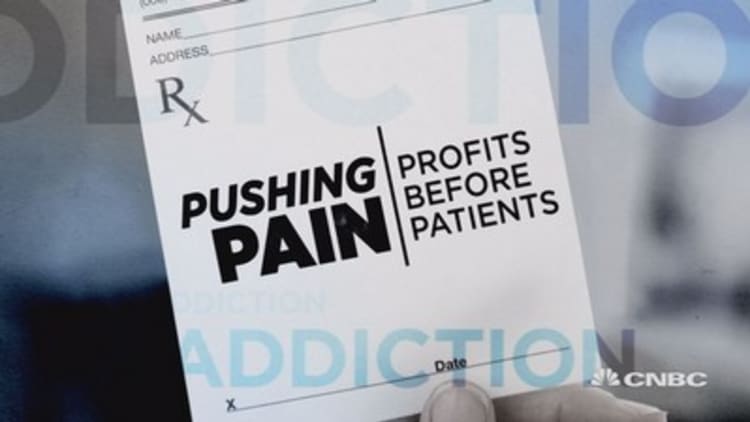
The case alleges that Insys — which has grown into a billion-dollar publicly traded company on the back of a single painkiller — engaged in a "massive fraud scheme and criminal enterprise to obtain money from Wayne for illegally prescribed painkillers through Wayne's employee health insurance plan."
Several legal experts told CNBC that the Wayne case is a unique use of a law in Florida designed to protect consumers from fraud and could set a precedent for how employers fight back against a drug epidemic that one recent study estimated could be plaguing 80 percent of U.S. workplaces.
If the allegations are true, "The extent of the scheme appears to be shocking. Abuse is rampant," said Steven Kramer, founder of central Florida firm Kramer Law, which has expertise in business law.
Insys was the subject of a recent CNBC investigation covering allegations against the company in at least six U.S. states. Subsys is also on a "drugs of concern" list kept by the U.S. Department of Health and Human Services' Inspector General office. The publicly traded company also faces class-action legal challenges from shareholders.
The painkiller in question is Subsys Fentanyl, an opiate 100 times more potent than morphine, which the FDA has indicated should only be used for late-stage breakthrough cancer pain.
Insys reported full year 2015 revenue of $330.8 million, though after growing in recent years, sales of Subsys hit a plateau in the fourth quarter, showing no increase from the previous quarter, at $91.1 million in revenue for the painkiller.
Wayne has 500 employees and has $75 million in annual revenue. The insurance plan offered to Wayne's employees is self-funded by the company — typical for a company of its size — so aside from employee contributions, like deductibles, Wayne pays all the costs of the health plan from its own coffers.
Wayne's case alleges that Insys worked with the help of a Florida-based physician and clinic, Gessler Clinic and physician Dr. Edward Lubin. Additionally, two other companies, UMR and OptumRX, are defendants in Wayne's case alleging illegal prescribing and dispensing of Subsys "with the sole motivation of financial gain including kickbacks."
UMR and OptumRX are third-party administrators to the Wayne health plan, contracted mainly to evaluate and process insurance and benefits claims. OptumRX is an affiliate of UMR.
"Dr. Lubin and the Practice illegally prescribed Subsys to an individual [the spouse of a Wayne employee] who was covered under Wayne's employee health insurance plan but did not have cancer, let alone breakthrough cancer pain."
The extent of the scheme appears to be shocking.Steven Kramerfounder of Kramer Law, on allegations in a lawsuit against Insys Therapeutics
An Insys spokeswoman said the company had only recently received a copy of the complaint and was in the process of reviewing the allegations. The company plans to vigorously defend itself in the lawsuit, the spokeswoman said.
Gessler Clinic declined to comment on specific allegations, citing patient privacy and other legal constraints, though Gessler administrator Sharon Hart said patient care has always been the first priority for the clinic. She said the clinic's attorneys will be responding to the complaint and it remains confident that it will prevail in the litigation.
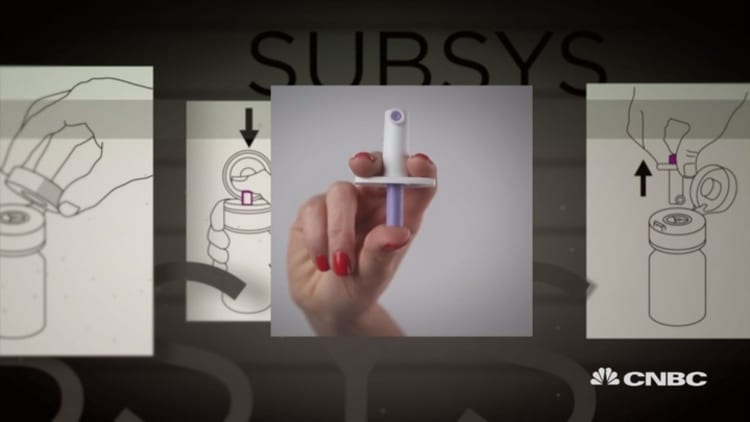
The lawsuit discusses an incident where an individual, who identified himself as "David," told OptumRX's prior authorization department that the patient had been diagnosed with malignant cancer pain by Dr. Lubin in order to get reimbursement for Subsys.
About a year after that phone call was made, Wayne learned that the patient had never actually been diagnosed with cancer and had become addicted to Subsys and was "debilitated due to her addiction."
In November 2014, UMR and OptumRX acknowledged that, based upon records they had obtained from Dr. Lubin, the patient had never been diagnosed with breakthrough cancer pain. Wayne alleges that it was not until after it had pressed its concerns with the third-party administrators over a long period of time that UMR and OptumRX finally found issues with the Insys prescription.
Insys' prior authorization unit and the extent of sales it derives from prior authorization prescriptions was also a subject of the CNBC investigation.
Wayne's claim was made under the Florida Deceptive and Unfair Trade Practices Act, which is a consumer protection law (businesses can be considered consumers).
The case could set a precedent, said Suzanne Meehle, founder of small-business law firm Meehle Law. "The employer is saying, 'We paid for this. … You engaged in off-label prescribing here to take our money.'"
While doctors can prescribe drugs for off-label use legally, it is illegal for a company to market off-label. Insys has been subject to a high level of scrutiny for the practice.
Amy Tingley of Stovash, Case & Tingley, an attorney for Wayne, said she was not aware of any cases under the Florida Deceptive and Unfair Trade Practices Act for off-label prescribing of drugs such as Subsys, though she could not rule out that a similar case could exist. She said Wayne and its lawyers would not be able to comment in any more detail about the case.
"It's a good use of the act. It's a broad statute, so not surprised they are using this," Kramer said, explaining that the Florida Deceptive and Unfair Trade Practices Act was designed as a catch-all and he has seen many novel uses of it.
Florida AG takes notice
Wayne's lawyers are also likely attempting to get the attention of the U.S. Attorney General or Florida State Attorney, according to legal experts, because the complaint includes charges under the Racketeer Influenced and Corrupt Organizations Act (RICO), which has both federal and state precedents.
Wayne's case says it paid out $200,000 related to the Subsys prescriptions, and it is also seeking in excess of $75,000 in damages under the Florida RICO Act. Meehle said that $75,000 is only the threshold for a case to be considered in federal court, so the company could ultimately seek more in damages.
In response to a request from CNBC, Kylie Mason, the press secretary for the Florida Attorney General Pam Bondi, said, "While we do not have a consumer protection investigation against Insys Therapeutics at this time, we are aware and looking into the matter."
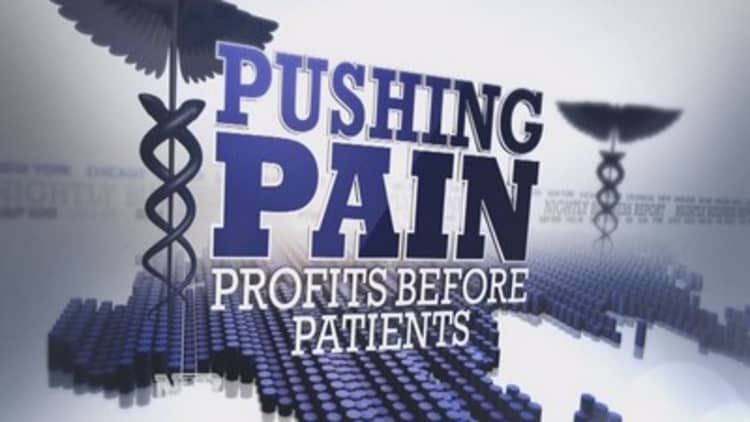
Dr. Edward Lubin received more than $100,000 from pharmaceutical companies in 2014 alone, according to Open Payments, a federal government site that tracks payments made to physicians. A majority of that money was given to him by Insys for things like speaker fees, travel and meals. Some payments exceeded $3,000 on a single day.
In 2013, Lubin was given more than $11,000 from pharmaceutical companies, one of which was Insys.
Dr. Lubin did not return calls.
OptumRX declined to comment. UMR did not return calls seeking comment.
To read Wayne Automatic Fire Sprinklers' full legal complaint, click here.






